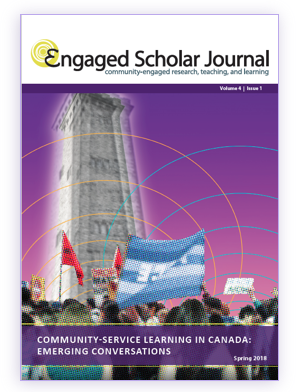Community Service-Learning: Why Can’t Canada Be More Like Mexico?
DOI:
https://doi.org/10.15402/esj.v4i1.307Abstract
In Mexico, the community service strategy and requirements for undergraduate students are both longstanding and mandated by the Mexican Constitution. Students undertake a minimum of 480 hours of service during their undergraduate degrees, which are coordinated through their universities’ Social Service (SS) departments. Many Canadian universities and colleges offer community service through courses and volunteer programs; however, the practice and adoption levels vary widely. Student involvement with community partners, as represented through community service-learning (CSL) and volunteerism in Canada, are sponsored by many post-secondary institutions but are not driven by a national agenda. While, in Mexico, community service is documented at a departmental and institutional level for reporting to stakeholders and the government, in Canada, documentation of community service varies with the institutional mandate and is often sporadic or non-existent; the imperative for systematic student engagement and citizenship development has not been recognized at the national level. This research paper provides an overview of the community engagement practices in both countries, with the national patterns represented through a summative review of selected Canadian and Mexican universities. Suggestions for processes and practices for Canada are proposed based upon the Mexican model.
Downloads
Published
Issue
Section
License
Authors who publish with this journal agree to the following terms:
- Authors retain copyright and grant the journal right of first publication with the work simultaneously licensed under a Creative Commons Attribution License CC BY 4.0 that allows others to share the work with an acknowledgement of the work's authorship and initial publication in this journal.
- Authors are able to enter separate, additional contractual agreements for the non-exclusive distribution of the journal's published version of the work (e.g., post it to an institutional repository or publish it in a book), with an acknowledgement of its initial publication in this journal.
- Authors are permitted to post their work online (e.g., in an institutional repository or on their website) after the publication of their work in the Engaged Scholar Journal.
- Please note that while every opportunity will be taken to ensure author participation in the editing process, due to time constraints final copyediting changes may be made before publication to ensure APA adherence throughout all submissions.




